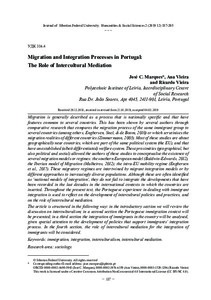Migration and Integration Processes in Portugal: The Role of Intercultural Mediation
Скачать файл:
URI (для ссылок/цитирований):
https://elib.sfu-kras.ru/handle/2311/109549Автор:
Marques, José C.
Vieira, Ana
Vieira, Ricardo
Маркес, Ж.К.
Виейра, А.
Виейра, Р.
Дата:
2019-02Журнал:
Журнал Сибирского федерального университета. Гуманитарные науки. Journal of Siberian Federal University. Humanities & Social Sciences;2019 12 (2)Аннотация:
Migration is generally described as a process that is nationally specific and that have features common to several countries. This has been shown by several authors through comparative research that compares the migration process of the same immigrant group to several countries (among others, Engbersen, Snel, & de Boom, 2010) or which scrutinises the migration realities of different countries (Zimmermann, 2005). Most of these studies are about geographically near countries, which are part of the same political system (the EU), and that have an established (albeit differentiated) welfare system. These proximities (geographical, but also political and social) allowed the authors of these studies to conceptualise the existence of several migration models or regimes: the southern European model (Baldwin-Edwards, 2012), the Iberian model of Migration (Malheiros, 2012); the intra-EU mobility regime (Engbersen et al., 2017). These migratory regimes are intertwined by migrant integration models or by different approaches to increasingly diverse populations. Although these are often identified as ‘national models of integration’, they do not fail to integrate the developments that have been recorded in the last decades in the international contexts in which the countries are inserted. Throughout the present text, the Portuguese experience in dealing with immigrant integration is used to reflect on the development of intercultural policies and practices, and on the role of intercultural mediation.
The article is structured in the following way: in the introductory section we will review the discussion on interculturalism; in a second section the Portuguese immigration context will be presented; in a third section the integration of immigrants in the country will be analysed, given special attention to the development of policies that support immigrants’ integration process. In the fourth section, the role of intercultural mediation for the integration of immigrants will be considered Как правило, миграцию описывают как процесс, имеющий некий пул общих и уникальных для различных стран особенностей. Некоторые авторы (Engbersen, Snel &
de Boom, 2010 и другие) сравнивают миграционные процессы одной и той же группы
иммигрантов в ряде стран или анализируют миграционные реалии разных государств
(Zimmermann, 2005). Большинство таких исследований посвящено странам, которые близко расположены географически, выступают частью одной политической системы
(ЕС) и имеют установленную (хотя и дифференцированную) систему социального обеспечения.
Подобная близость (географическая, политическая и социальная) позволила
авторам исследований построить ряд миграционных моделей: южно-европейскую
(Baldwin-Edwards, 2012), иберийскую (Malheiros, 2012) и модель мобильности внутри
ЕС (Engbersen et al., 2017). Названные миграционные режимы связаны между собой подходами к интеграции разных групп населения. Хотя их зачастую называют
«национальными моделями», они встраиваются в общий международный сценарий,
складывающийся в мире последние десятилетия. В данной статье рассмотрен португальский опыт работы по интеграции иммигрантов, который служит информацией к размышлению о развитии национальной политики и межкультурной практики,
а также о роли поликультурной медиации в этом процессе.
Структура статьи включает вводный раздел, где представлена дискуссия о межкультурности, далее описан португальский иммиграционный контекст, дан анализ
интеграции иммигрантов в стране (особое внимание уделено разработке политики,
поддерживающей процесс интеграции иммигрантов) и, наконец, показана роль межкультурного посредничества в интеграции иммигрантов
Коллекции:
Метаданные:
Показать полную информациюСвязанные материалы
Показаны похожие ресурсы по названию, автору или тематике.
-
Cases on Intercultural Communication: New Approach to Design
Tareva, Elena G.; Tarev, Boris V.; Тарева, Е.Г.; Тарев, Б.В. (Сибирский федеральный университет. Siberian Federal University, 2018-10)The subject of the article is problem situations of intercultural communication, which lie in the basis of Case-studies – specialized descriptions of real situations containing problems, which must be analyzed and solved. ... -
Functional Specifics of Mediatext in the System of Development of Intercultural Communicative Competence
Tarev, Boris V.; Тарев, Б.В. (Сибирский федеральный университет. Siberian Federal University., 2014-10)The publication raises the question of the status and characteristics of a mediatext in the system of language training aimed at development of students’ intercultural communicative competence. The author represents the ... -
Intercultural Communicative Competence as an Aim of Teaching Foreign Languages in Comprehensive School
Tareva, Elena G.; Budnik, Anastasia S.; Тарева, Е.Г.; Будник, А.С. (Сибирский федеральный университет. Siberian Federal University., 2013-11)The article mainly focuses on the essence and structure of the intercultural communicative competence of senior pupils. First of all, it reveals the basic personal features required for successful intercultural communication. ... -
Russian Literaure in the 20th Century English Translations the Problem of Cultural Context
Kazakova, Tamara A.; Казакова, Т.А. (Сибирский федеральный университет. Siberian Federal University, 2016-05)The article is dedicated to problems of the Russian literature translation into the English language, and, in particular, to the question of differences both in the content and forms transferring, which are caused by ... -
The Cambridge BEC as an Academic Context Model of Problematic Situations in Professional Intercultural Communication
Marina, Olga A.; Smirnova, Olga V.; Марина, О.А.; Смирнова, О.В. (Сибирский федеральный университет. Siberian Federal University, 2016-04)The article aims at finding appropriate measurement instruments for the assessment of communication mobility (CM) development as an important component of professional intercultural communicative competence. The comparative ...

